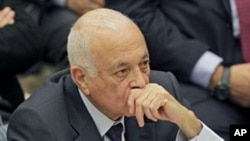The Arab League is urging the U.N. Security Council to support its political plan to end the crisis in Syria, where more than 5,400 people have died during the past 10 months. Special session on Syria was held Tuesday.
Qatari Prime Minister Sheikh Hamad Bin Jassim Bin Jabr Al-Thani, whose country holds the rotating presidency of the Arab League, told the 15-member Security Council that the Syrian government has failed to meet its commitments to the Arab League to end the violence and that it is clearly pursuing a military strategy to end nearly a year of anti-government protests.
“The fact of the matter is that bloodshed continues and the killing machine is still at work; violence spreads," he said.
On Monday, Syrian human rights groups say 100 people were killed in one of the bloodiest days since the protests began last March. There were reports of more deaths on Tuesday.
Sheikh Hamad said that if the situation continues, it will threaten the stability of the region and could result in the “most serious consequences.” He said that if the Security Council does not adopt the Arab-sponsored, Western-backed Security Council resolution endorsing the Arab League plan, it would send the wrong message to the Syrian government and encourage it to continue oppressing its people. He said the Arab League does not have ulterior motives.
“We are not calling for a military intervention," he said. "We are advocating the adoption of economic pressure to bring the Syrian regime to understand that it cannot avoid meeting the demands of its people. We are not after a regime change because we believe this is a matter the Syrian people should decide.”
Arab League Secretary General Nabil ElAraby also addressed the ministerial meeting.
“We, therefore, believe that the first priority now is for the Security Council to adopt a resolution demanding that all parties - I repeat, all parties - immediately cease fire, protect Syrians and support the Arab plan toward a peaceful, political settlement of the crisis," said ElAraby.
U.S. Secretary of State Hillary Clinton expressed Washington’s support for the Arab League request and told the council’s members that they have a choice - to stand with the people of Syria and the region or become complicit in the continuing violence.
“It is time for the international community to put aside our own differences and send a clear message of support to the people of Syria," said Clinton. "The alternative - spurning the Arab League, abandoning the Syrian people, emboldening the dictator - would compound this tragedy, and would mark a failure of our shared responsibility, and shake the credibility of the United Nations Security Council.”
British Foreign Secretary William Hague also urged the council to endorse the Arab League initiative, saying the plan offers a credible and viable way out of the violence.
“It would remove the major stumbling blocks to reform and give confidence to the Syrian people," said Hague. "It would start an inclusive Syrian-led political process that would allow the Syrian people to determine their future peacefully. And it would lead to a national unity government and elections.”
In October, Russia and China used their vetoes to block a western-backed Security Council resolution condemning the violence in Syria. On Tuesday, they expressed their continuing reservations.
Moscow, Damascus’ long-time ally, also has expressed fears that any resolution could pave the way for military intervention, similar to what happened in Libya.
Russian Ambassador Vitaly Churkin:
“We will not stand for any sanctions resolutions or using the council’s tool box so as to fuel conflict or possibly justify any foreign intervention in the future," said Churkin. "But this is not the matter at hand. The council cannot impose the parameters for an internal political settlement; it simply does not have the mandate to do so under the [UN] Charter.”
China’s envoy Li Baodong echoed the Russian position, saying that Beijing takes a cautious approach to sanctions and opposes practices that push for regime change.
Diplomats said negotiations would continue in the coming days on the proposed Security Council resolution in an effort to reach a consensus or at least avoid a Russian and/or Chinese veto on the measure.
Arab League to UN: End Syrian ‘Killing Machine’ Now








